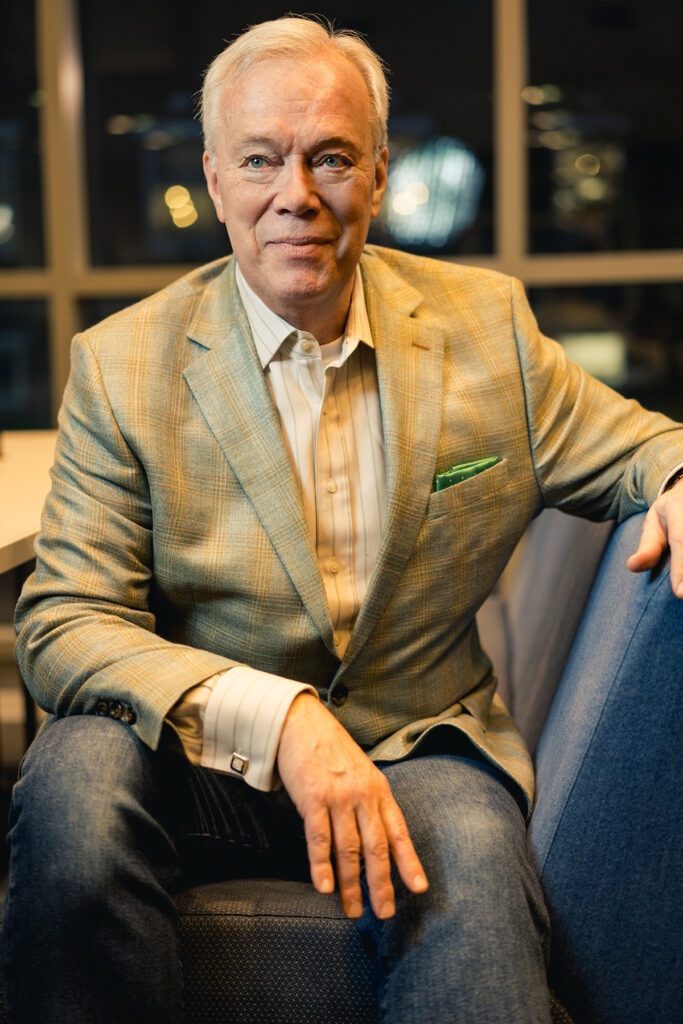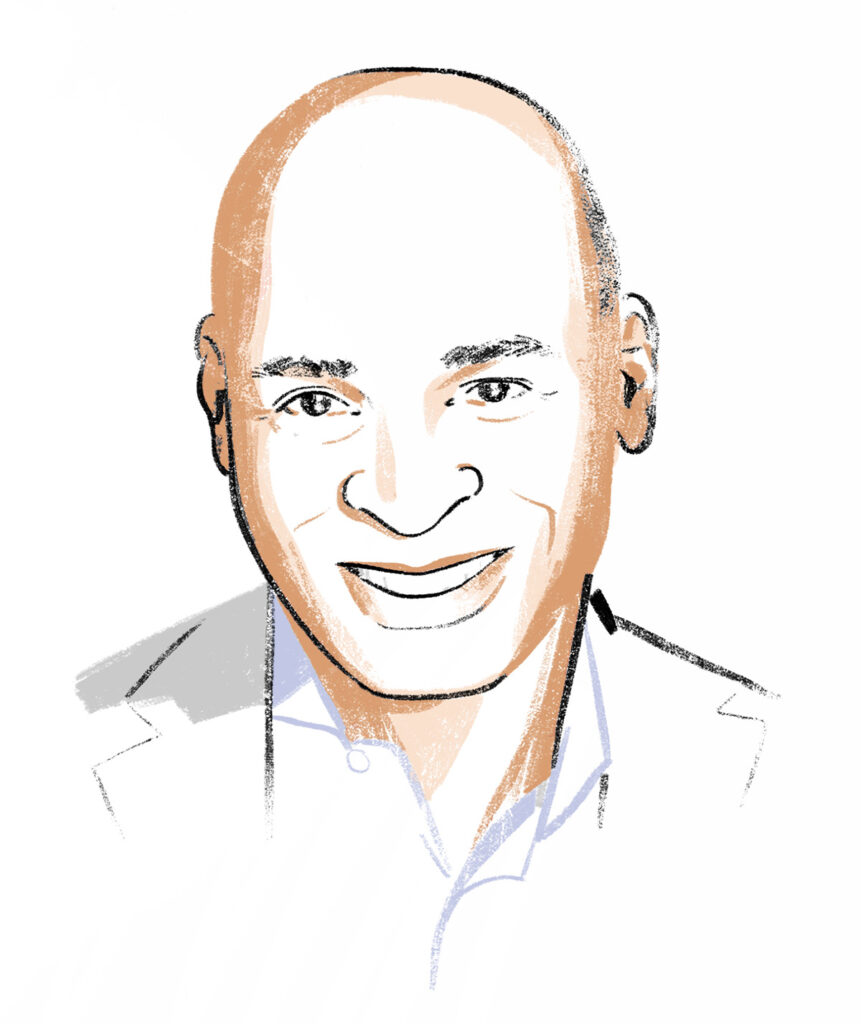Choice Not Chance
Timothy Gearty, BS’77 (Ruth), is a managing partner of the CPA firm Gearty & McIntyre, LLP, CPAs and the national editor-in-chief and national lead instructor for Becker CPA Review. He taught accounting and tax courses in FDU’s Silberman College of Business from 1980–1986. He now serves as vice chairman of the Silberman College Board of Advisors. In September, he received Silberman’s Hall of Fame Award for Changing Lives.
Julius Goldsmith, BS’85 (Flor), an international tax lawyer, is cofounder of a tech start-up company Playaz4Playaz.com, where athletes from around the world can connect directly to their fans one-on-one while monetizing their brands. He has worked in international tax law for the past 20 years and lives in Japan with his wife and son. He is a member of the Silberman College Board of Advisors.

Timothy Gearty (Photo: Bill Cardoni)
The two met when Gearty taught Goldsmith. Goldsmith was a defensive back on the FDU Devils football team, and Gearty, who once played football himself, soon started attending the games to cheer Goldsmith on. Ultimately, they became friends. “It was easy to relate and to build a bond,” Gearty says.
“The whole concept of mixing law and finance and accounting wasn’t really something that I was aware of until I met Tim,” says Goldsmith. “I find reading the rules and laws of U.S. tax law, relative to other countries’, and putting the two together to see where there are legal opportunities, just fascinating.”
Gearty helped Goldsmith to secure interviews for his first two jobs after graduation.
Julius Goldsmith: Tim, my first question for you is, what is the biggest lesson you learned during college?
Timothy Gearty: The biggest thing I learned was that choice, not chance, will determine your destiny. That’s probably the biggest single truth that my professors ingrained in me.

Julius Goldsmith (Illustration: Arthur Mount)
J.G.: Did you have a mentor at some point in your career and, if so, how did he or she help you?
T.G.: [The late Professor of Accounting and chair of the Accounting and Quantitative Analysis Department] Stan Iwanski, MBA’66 (Ruth), at the Rutherford Campus. He was a legend. And [the late Associate Professor of Accounting] Ken Gillies.
Then, when I taught at FDU, there was Bob DeFilippis, former associate professor of accounting and chair of the accounting department at the Florham Campus [now an adjunct faculty member]. Bobby and I are dear, dear friends. He really helped mentor me in my teaching career.
All three of them inspired curiosity in me and modeled career-long love of learning. Never stop learning. That was the message they all sent us.
J.G.: So, why did you become a mentor, and how did it happen?
T.G.: First of all, my family always taught me to pay it forward. You’re not going to be able to pay back people who’ve done great things for you, but remember, do it for the next person. That was part of it.
And I’m a people person! I love to engage in conversation and get to know people. Through that, you hear what they need, and you realize, “Hey I’ve got an opportunity to introduce them to so and so.” I can put two people together.
There’s a tremendous amount of feeling in helping somebody, in inspiring somebody to move forward. You know that you’ve impacted their life positively, and that’s a huge benefit.
J.G.: Thinking back to when you got your juris doctorate [J.D.], did you envision your career as it is today; and if not, what did you see ahead for yourself?
T.G.: Well, I always anticipated that I would stay in accounting, in tax auditing in a CPA firm. And I am managing partner of the Gearty & McIntyre, LLP, CPA. The part that I never anticipated was becoming a teacher — a professor.
That happened because Stan Iwanski had an immediate need for one. He called up and said, “By any chance, would you be interested in helping us out and teaching some classes?” And I really enjoyed it.
Becoming an educator, both as the national instructor for Becker CPA Review and at FDU, was something I never expected, but it has probably been the most rewarding part of my professional career.
J.G.: Tim brought a certain energy level to the campus, whereby he engaged students in a lot of different ways. Education is clearly a part of it, but we also looked forward to going to Tim’s class. Accounting, to be honest with you, I thought it was interesting; but it wasn’t until I had Tim for tax, that I saw a whole different world. I owe that in part to Tim and the way he taught the subject.
J.G.: What are the most important decisions that you face daily, in terms of being a leader at Gearty & McIntyre?
T.G.: That’s the easiest question. Ethics and integrity. No question. It’s obviously doing the right thing. It’s obviously doing right by people. Ethics and integrity are an integral part of any job, and certainly if you’re a leader. Leading by example is essential.
J.G.: And what advice would you give a new employee going into a leadership position?
T.G.: The most important way to engage your team is to literally listen. My dad used to say, “You have two ears and one mouth; use them proportionally.” Listening is very important, because only through listening and understanding and creating communication can you build trust and then lead.
J.G.: What are the most important traits among global leaders of today?
T.G.: In addition to integrity, it’s obviously transparency. No leader is going to do everything right. They are human. You’re not going to agree with everything that any leader says. But if they’re transparent with you — if they are not misleading you — that’s a great trait to have.
J.G.: Going back to you, how do you go about building and maintaining your network?
T.G.: One word: communication. It’s staying in touch, because with communication you continue to build the relationship. You continue to build trust. Communication is the building block for trust and a long-term relationship.
J.G.: Since you’re very much in a public space as a speaker, what practices can you recommend for folks dealing with nervousness in front of a group?
T.G.: Start small. Talk to one person, one on one. Then present it to two or three people in a small, little intimate office meeting. Then move it up to a bigger meeting. And, of course, practice.
J.G.: What’s a huge risk that you took and it paid off?
T.G.: Leaving the security of being an employee of a successful company and starting my own business, Gearty & McIntyre. If I look back now at the risk I was taking, I probably would have said to myself, “You’re crazy!” But I really had a passion for wanting to do this, so I took the chance. And it’s been a fulfilling career. I look back, and I’m very happy that I chose this path.
J.G: What are your top-three tips for time management?
T.G.: There are so many items. Work smarter not harder. Really prioritizing your tasks is fundamental to time management.
One of the biggest obstacles in prioritizing is your email habits. You can get sucked into answering the voluminous amount of email. Pick times to manage messages.
And then there are meetings. Meetings, and meetings about meetings, and meetings about how your meetings went. Effective meetings are essential, especially as you grow in the company. But pick times that are effective for meetings and keep them on track.
J.G.: Last question, Tim — which TV or movie character is most like you and why?
T.G.: I thought cartoons first and honestly, I guess, from my vantage point, I’d say Bugs Bunny. He was a little bit of a character. You know, “What’s up doc?” and a little funny. The perspective he had — like he’s telling the audience, “Look at the maroon over there!” — was obviously somebody who is able to survive and thrive.
J.G.: Tim, you are an exemplary mentor who leads by example. Thank you for always being positive, being a motivator and having a great sense of humor. Your guidance has helped not only me, but also countless other professionals whose careers, like mine, are indelibly shaped by your dedication to helping others. Thank you.